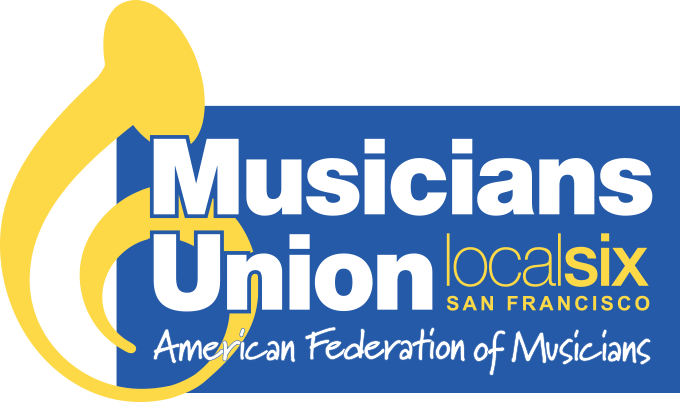David Borough: “Cool!” by Alex Walsh
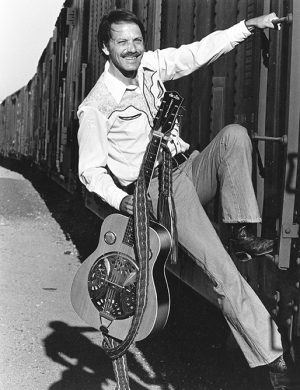
David in 1980. Photo: Don Day
David Borough is a songwriter, guitarist, fiddle player, devoted Dead Head, radio DJ, and Local 6 Member. He joined Local 153 (San Jose) in 1979 and continues to play around the Bay Area and beyond.
David Borough decided to become a songwriter under a peppercorn tree in front of the Music Department building at San Jose State University in 1967. He was just coming out of the business school and was on his way to get his motorcycle when he heard a musician named Bing Jensen singing the Phil Ochs song ‘Crucifixion’. Transfixed, he sat for hours and talked with Bing about songs and songwriting. Up until that time he had dabbled with folk music, but now he was hooked.
David migrated west from South Bend, Indiana, after seeing a photo of the Grateful Dead playing in Golden Gate Park in a Time magazine article. His older brother had already made the move to San Jose so David thought, “Why not?” His plan was to crash with his brother for a little while and then return home. After a few weeks in San Jose, David borrowed his brother’s car and headed for San Francisco’s Haight Ashbury district, picking up a few hitchhikers along the way. When they asked him where he was going he said he didn’t know exactly. “I had short hair and I was driving my brother’s ’65 Thunderbird. They said, ’Why don’t you come with us?’ They brought me to Marx Meadow in Golden Gate Park where the Sons of Champlin were playing. There were hundreds of people just hanging out and having a good time. I thought it was amazing. I knew right then I wasn’t going home.”
A few weeks later, David saw his first Grateful Dead show at the Fillmore in San Francisco. After that he became a dedicated Dead Head. “Where would I be without that band and what they did? They replaced my birth family. When my dad died in 1972 the Grateful Dead community was my emotional support network. It was very nurturing.”
“My first time in the Fillmore, I walk up to the top of the steps and there’s Bill Graham. Everybody’s walking by and he’s looking at people–I’m sure just to see who’s going to be a troublemaker. I walked up to him, shook his hand and said, ‘Hey Bill, thanks for all the music!’ He looked at me and said, ‘You’re…welcome?’ Like no one had ever thanked him for it! It was so cool. I went in to see the Dead and I was blown away.”
After college, David worked as a letter carrier for the post office and as a surveyor for the Federal Highway Administration. He says it never occurred to him that he could pursue music as a profession. “Musicians were people you saw on TV or heard on the radio. There was this insane process to get there that I didn’t know anything about. For me it just happened organically which I think happens to a lot of us. We’re drawn to music and then somebody offers us money to play a wedding.”
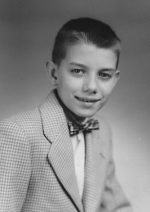
David at 11
Music was part of everyday life when David was growing up. His grandfather played the fiddle and his father, a doctor in the army, played piano and organ. His mother was a dancer. She passed away when he was nine.
In grade school David played trumpet. In high school he played the accordion but switched to guitar when he went to college. He started at community college in Corpus Christi, Texas, and in 1965 returned home where he enrolled in Indiana University, South Bend.
For the next two years he put music aside and devoted all of his spare time to Go Kart racing. David bought a Go Kart from a local builder and began racing three nights a week on local Go Kart tracks. “Eventually the Go Kart scene developed to where we were racing on sports car tracks at 100mph. I left racing because someone stole my Go Kart, and I was going to California.”
When he transferred to San Jose State in 1967, David was studying marketing at the Business School, but after his musical epiphany under the peppercorn tree he switched to the Art Department and eventually graduated with an Art degree. During the 1970s he immersed himself in the counter culture and worked on his music.
In December 1979, David was hired to play his first New Year’s Eve gig. He needed a bass player so he called Local 153 where he was encouraged to join by then President Don Houge. “I was already a union man, working on private crews in the South Bay with Operating Engineers Local 3, so it made sense to join.” Don referred him to a bass player named Tito dal Porto. They hit it off and decided to form a country band called Maker’s Mark. “The scene in San Jose was really jumping. There were a lot of dance halls, bars, and malls that had country music.”
In the early 1980s David joined the South Bay Songwriters Association (which later became the West Coast Songwriters Association). He won free studio time at a song competition and was able to make a few recordings. The studio owner, Hewlett Crist, was also a DJ on the now defunct KFAT radio station. He liked David’s music and asked him to come by the station to play a few songs. Through this experience, David became interested in radio and began volunteering at KKUP. “Someone asked me to sit in, I think it was a jazz show, at some ungodly hour, like 3:00 in the morning. The program director liked what I was playing and offered me a shift. That started my radio career.”
During this time David released two 45s and a cassette of his music. A few years later he made a trek to Nashville to see if anyone would be interested in his songs. “My family invited me to join them at the Kentucky Derby so I went back and as part of my trip I got on a bus and went to Nashville. I walked up and down Music Row knocking on doors. I finally met a publisher who told me what they were looking for–early Eagles. So I spent a good amount of time trying to write songs like the early Eagles.”
David felt enlightened a few years later when another publisher told him point blank that he was not a country songwriter; that he wrote folk songs. “That’s when I realized I had to get my music out there by myself rather than trying to pitch my songs to other people.”
In the late 1980s David started a folk duo with a singer named Lisa Burns. They called themselves BurnsBorough and played folk clubs and retirement homes. He also pursued performing as a solo artist. During this time he developed his photography skills and took promo pictures for local musicians. For a few years he was able to supplement his income by providing photos for corporate newsletters. This work dried up with the advent of digital cameras.
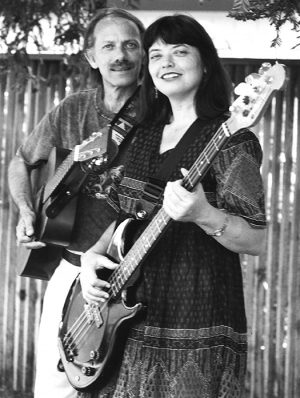
David Borough and Jackie Loken
In the mid-90s David formed a folk/country band with bassist Jackie Loken called Radio Rail. They came up with the name because they were hired by the CA State Railroad Museum to play for their Railfest. “We were riding up and down the Sacramento River on trains. It was lots of fun. Then we got this idea to commemorate the completion of the Transcontinental Railroad. We put together a program at the Eagle Theater in Sacramento and Jackie and I opened the show. We sold out the theater for a couple nights.”
Radio Rail released a CD in 1997.For the next 15 years, in various forms, David and Jackie performed with Radio Rail every Labor Day in Sacramento for Gold Rush Days. “They took all the cars out of Old Town and everyone dressed in costume. They hired musicians to play in the street and on sidewalks. Originally it was great. They’d give us hotels. That went on for quite a while, up until 2013. Now they don’t have a budget for music so we don’t do it anymore.”
In the late 90s David took a staff position at Local 153 and was soon elected as Secretary of the Local. “I learned so much about the symphonic world, working under CBAs and how different it was from working in a bar. I loved the conventions, Western Conferences, and regional meetings where we worked to better the lives of all working musicians. I was especially interested in helping those in the freelance scene.”
Though he voted for the merger with Local 6, David was heartbroken when Local 153 closed. “It was a big change and took a lot of adjustment. I found myself with an abrupt end to my daily structure.” David was pleasantly suprised when members continued to call him with questions about contracts, scales, and benefits. “It felt great to still be in the loop. I would always refer calls to the Local 6 office, or to the website. Because Local 6 is so large geographically, I think it would be useful if there was a satellite office or something in the South Bay.”
For many years David has been a member of AFM Local 1000, the traveling musicians union which helps singles, duos, and small folk ensembles tour the country. “Over the years I’ve used Local 1000 contracts and scales for working up in Gold Country with a group called Wind Horse. We play benefits for causes such as saving wild horses and honoring those who lost their lives working in gold mines.”
In 2001, David formed Cassady’s Hammer, a rock trio where he plays guitar and sings. Inspired by beat icon Neal Cassady and his twirling hammer, they play roadhouses and bars, doing long extended jams and then breaking down to read Jack Kerouac excerpts. David was honored when Neal Cassady’s son, John Allen Cassady, joined them for a few gigs.
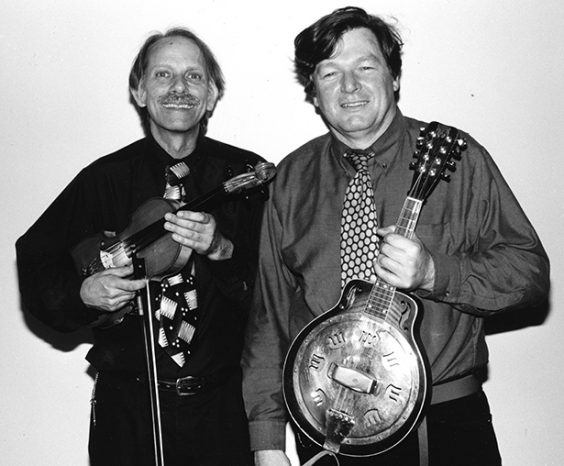
The O’Davey’s Irish Band: David Borough and David Winters. They released a CD, “Raw”, in 2005
In 2004, David formed an Irish duo with Local 153 Treasurer David Winters called The O’Davey’s Irish Band. They mainly played Irish Pubs in San Francisco. One St. Patrick’s Day David recalls playing at Harrington’s Pub at the corner of Turk & Larkin during the parade. “It was packed. We loaded in and started our usual set. People were really drunk and falling out. The bartender walks across the bar, fighting the crowd, and comes up to us and tells us to play reels. In other words, ‘Stop fooling around with these ballads and hit it!’ We start pounding out reels and all of a sudden the crowd parts and we see these teenage girls, about nine of them in rows, in their dance costumes. One of them looks around and smiles at us, waits for the downbeat and then says ‘Go!’ And they start stepdancing. It was amazing.”
Sadly, David Winters passed away unexpectedly in 2014. “I was devastated. We had all these gigs booked. I gave away the work as I simply couldn’t bring myself to do it without him. We worked together at Local 153 for fifteen years and played in the O’Davey’s for ten years. David was a great friend and a wonderful human being.”
Up until recently, David played electric fiddle with O’Craven, a Celtic/ Pirate punk band based in San Jose. It was David’s first exposure to the punk scene. “It was a revival of 90s punk. O’Craven drove the scene along with a few other bands. It was very cooperative. If somebody needed an amp you gave them an amp. I remember one time a fellow was playing string bass in a rockabilly band and the bridge popped out. He kept singing and our guys ran in the back, grabbed an electric bass, strapped it on him, plugged it in and he finished the song. That kind of community spirit is fantastic.”
Now past age 70, David continues to perform and write songs. He sits on the Board of KKUP and fills in as a DJ on occasion. Every December he produces the Grateful Dead Marathon which helps raise money for KKUP. Even in this current political climate, David is hopeful about the future. As a proud AFM Member, he believes that now is the time for musicians to work together and organize.
“What gets me up in the morning is live performing, collaborating with other musicians, and making that musical connection with the audience. When I’m performing at a farmer’s market or some other venue and someone stops to listen and smiles because they get it—that makes it all worth it.”
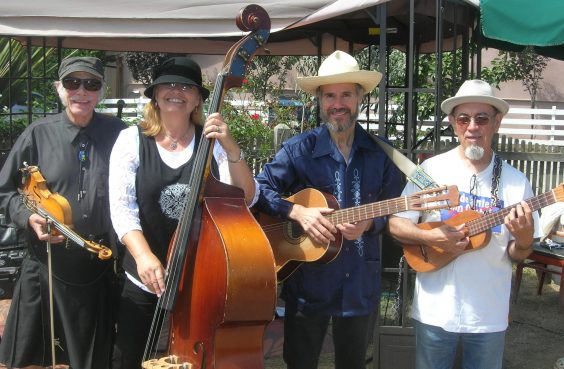
In 2013, David helped form the group Son Patricio: David Borough, fiddle, Jackie Loken, bass, Isidro Jimenez, guitar, Tomas Montoya, Jarana Jarocha “When the Irish came to America in the mid part of the 19th century, pre-civil war, they were often pressed to serve in the army where the officers were of English descent. During the Mexican American war, when the Irish soldiers would get into battle with the Mexican army, they felt they had more in common with the Mexican soldiers, who were Catholic, than with the English officers, who were Protestant. So they changed sides and became the San Patricio’s (Saint Patrick’s Battalion). When they lost the war, many of the San Patricio soldiers were executed for treason. Today there are commemorative statues in Mexico City and Dublin.
My interest in Irish music led to the formation of a project called Son Patricio which highlights the connection between Ireland and Mexico. With our group Son Patricio we do Mexican and Irish songs. We do a few events around St. Patrick’s Day and Cinco De Mayo. The Irish Mexican association hires us for their annual dinner. We wear costumes for that. A lot of things have gotten theatrical where you bring more to it than just the music. It’s more work but it pays off with the audience.”
“As a participant in our amazing downtown San Jose music scene, I feel that organizing Freelance musicians will prove to be a fruitful area for Local 6 activity. Such organizing will mobilize progressive thinking and activity, create an air of solidarity, and build community. I believe such outreach is imperative, and we simply must undertake this.”
